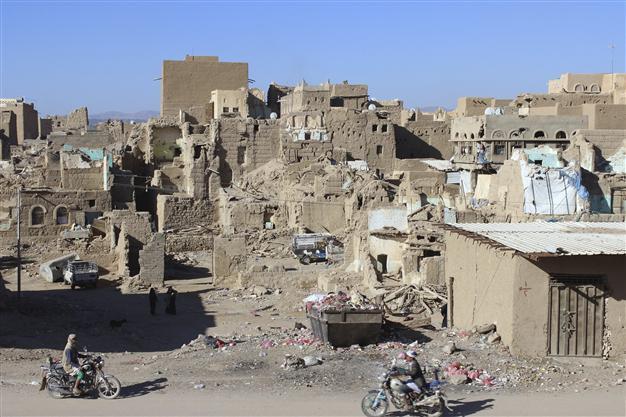Al Qaeda militants take over two south Yemen towns, residents say
ADEN – Reuters

People ride motorcycles past houses damaged during recent conflict in Yemen's northwestern city of Saada December 1, 2015. REUTERS/Naif Rahma
Al Qaeda have retaken the two major southern Yemeni towns of Zinjibar and Jaar, while Yemeni Prime Minister Khaled Bahah rejected a cabinet reshuffle ordered on Dec. 1, by Hadi.
Residents said the Al Qaeda militants launched a surprise attack and clashed with the local forces, known as popular committees. The militants then set up checkpoints at the entries to the towns and announced over loudspeakers after dawn prayers their takeover of both towns.
Jaar and Zinjibar, the capital of Abyan province, are about 50 km east of the main port city of Aden. They had fallen previously to militants from al Qaeda in the Arabian Peninsula in 2011.
At the time, the militants were emboldened by waning government control over the impoverished country during Arab Spring protests that eventually ousted former President Ali Abdullah Saleh.
The Yemeni army drove the militants out just over a year later.
This time, the country is convulsed in a protracted conflict that pits Shi’ite Houthi fighters and forces loyal to Saleh against a Saudi-led coalition and fighters loyal to President Abd-Rabbu Mansour Hadi.
Abdullatif al-Sayed, the head of Popular Committee fighters in Abyan province, said that he tried to repel the attacks and had informed officials what al Qaeda had been planning, but to no avail.
“The entrance of al Qaeda this time happened in the absence of any state institutions, which al Qaeda exploited,” said Zinjibar resident Fadl Mohammed Mubarak.
Yemeni PM rejects president’s cabinet reshuffle
Meanwhile, Yemeni Prime Minister Khaled Bahah rejected a cabinet reshuffle ordered on Dec. 1, by Hadi, a senior government official said, another sign of the deepening rift between the two leaders.
Hadi said earlier on Dec. 1 he was replacing five ministers, including acting Foreign Minister Reyad Yassin Abdulla, according to a decree carried by the Hadi-run state Saba news agency.
The Saudi-backed Hadi, who returned to the southern city of Aden last month after he was driven into exile by Houthi fighters in March, is trying to restore his authority in areas recaptured by his supporters from the Iran-allied Houthis.
The dispute could further complicate efforts by a Saudi-led military coalition, which has been fighting the Houthis for the last eight months, to restore Hadi to power.
“A personal announcement will be issued rejecting the ministerial changes because they are illegitimate,” the source told Reuters, adding that Hadi had made the changes without consulting Bahah, who is also the vice president.
Officials from Hadi’s office could not immediately be reached for a comment.
In a statement issued early on Dec. 2, Bahah warned that Yemen was passing through “an exceptional era [in its history] and we must not allow mistakes to pass.”
“Rashness must end, and we will try to achieve that, and when we fail to push it away, we will be more clear with our people, our brothers and with ourselves before anybody else,” Bahah wrote in a Facebook posting that did not mention Hadi or refer to the cabinet reshuffle.
